The War of the Worlds (2019)
Directed by: Craig Viveiros
Written by: H.G. Wells, Peter Harness
Starring: Eleanor Tomlinson, Rafe Spall, Robert Carlyle, Rupert Graves
UK
AVAILABLE TO WATCH ON AMAZON PRIME
RUNNING TIME: 3 x 55 mins
REVIEWED BY: Dr Lenera, Official HCF Critic
1905, Edwardian England. In his observatory near Woking, astronomer Ogilvy is observing some strange eruptions on the surface of Mars. He befriends journalist George and Amy, who have just moved to start a new life together despite George being married to someone else. At the same time as six trawlers are mysteriously sunk in the North Sea which increases tensions with Russia, a strange meteorite lands on Horsham Common. The three go to investigate, not knowing that it’s really a spaceship that contains a huge and deadly machine from Mars, and that it’s one of many out to take over our planet….
My first encounter with H.G. Wells’s tale of Mars invading Earth was the wonderful album from Jeff Wayne that first came out in 1978. At aged about 8, the thing scared the shit out of me, but the catchy music and thrilling story got me returning to it over and over again as well as getting me to read the book which it turned out had been adapted pretty closely by Wayne. Not long after that I watched the updated 1953 film version and was disappointed that it was so different though I grew to love it, and the 2005 version turned out to be pretty good too, though this story seems to always be popular, even as far back as 1938 when Orson Welles’s radio version made loads of Americans panic because they believed it was real. But it’s been one of my dreams that one day somebody would make a version of The War Of The Worlds really faithful to the book that would also be set in the time in which Welles wrote and set it. And it’s still one of my dreams, because they certainly haven’t achieved it with this lousy mini-series. Nor have the makers succeeded in making something that’s much good. I don’t remember hearing about it before, but it was actually made back in 2017, and then after a lengthy delay scheduled to be shown over Christmas in 2018. That didn’t happen either, and it was then shown in several other countries before the BBC finally revealed it to us in the UK. If I’d known about all this before, I should have clicked that the Beeb had a turkey on their hands.
The fast-paced, frightening yet at times still thoughtful book is one of those novels that, to be turned into a movie or a TV mini-series, would not need to be changed much. At all. It’s not even especially dated. So it’s hard to work out why on earth writer Peter Harness [and perhaps the notoriously meddling BBC executives] came up with something that’s not much like it. Of course the outline is there as are some of the major scenes and characters, but they’re virtually drowned out by all this new stuff, most of which is hardly an improvement and some of which borders on being terrible. And little things like moving the setting a decade forward may not make much difference really, but are just pointless and petty. But even if you ignore the book, this is still a borderline disastrous endeavour, saddled with a budget that’s so ridiculously low for something called The War Of The Worlds that it often feels like you’re watching something from the Asylum lot [who make lots of straight-to-DVD rip-offs of major movies], though not nearly as much fun despite containing a few really ineptly handled sequences and some curiously indifferent performances. It’s often very ugly to look at because every other scene is tinted a sickly light green, lacks any sense of urgency despite what it’s about, and like unfortunately so many things these days feels that the story needs typical sledgehammer messaging on favourite right-on topics, here institutional sexism, the environment and British imperialism. Wells wrote his book in part as a commentary on the catastrophic effects of colonialism on indigenous Tasmanians. However, he realised that intelligent readers would probably be likely to get at least the basic idea without him being too obvious. By contrast, here we have somebody going on about how the Martian invasion is probably a punishment from God for what the British had done to other people all over the world. I’m just surprised it didn’t make an issue of race too.
A variant on the music album’s unforgettable opening sentences [themselves very similar to the beginning ones in the book] is heard as we move through some clouds and to the surface of Mars. Something blasts out of the ground and into space. “Did you see a pillar of smoke”? asks astronomer Ogilvy to his two companions as they take turns looking through his telescope. They are George and Amy, an unmarried couple living together while George is still married [maybe based on Wells himself?], cue for some rather extraneous material that all but takes the place of a suspenseful build-up. Can George reconcile with his high-up estranged brother Frederick in time to get his blessing for their premarital union before the Martians take over Parliament? Will George convince his wife to sign the divorce papers before divorce and marriage are made virtually irrelevant? Will Amy’s wallpaper arrive in time for the workmen to hang it and let it dry before giant tripods wreck their flat? Does anyone actually care? Of course there’s nothing wrong with introducing and spending time with characters before the mayhem starts, and sometimes it can thematically link to what follows quite cleverly [a la The Birds], but here we’re just saddled with very awkward dialogue spoken by people you care so little about that you just want the Martians to turn up right now and obliterate the lot of them – well, except for Robert Carlisle who at least looks like he’s enjoying playing his role as Ogilvy. A round meteorite lands, and George, Amy and Ogilvy are soon joined by others including an official who oddly says, “This is common land, they’re perfectly entitled to be here”. Eventually we get some genuine suspense as the meteorite is poked and prodded and sheds its ‘skin’ to reveal itself to be a huge cannon ball – it takes ages but one is at last riveted. Then it rises into the air, spins round and unleashes black specks which cause people to burst into flames, cue some of the worst looking CG fire ever, and people leaving the place surprisingly lackadaisically considering what’s going on.
A huge tripod then attacks the village, though we hardly see anything, and then our couple – who by the way both know how to ride horses – are separated. Will they find each other in the second episode? And will they be able to get out of the country? Can the army make any headway against these seemingly invincible invaders? Any excitement is continually diminished by a variety of factors. Prime among them is the bizarre decision to frequently cut away from the main story to ten or so years later when the world is a wreck despite us having won the war, through which a woman and a small boy walk and are trying to survive. She’s attempting to find something. You’ll guess who they are before the reveal. It’s possible that starting in the future and then periodically flashing back may have worked, but as it stands this device causes all sorts of structural problems in the story which Harness can’t sort out no matter how much he tries, and in the end it just seems to be just an excuse to insert some environmental and anti-Christian messaging. While the first transition to the future is rather good, a bright speck in the sky becoming a torch being carried by a man in a mask, these end up interrupting the main action in an increasingly irritating way. Then there’s the way so many scenes are staged, with characters, especially Amy, tending to stare a lot at things for quite a while. This would be fine in an arty drama but for god’s sake this is The War Of The Worlds, you need to keep moving, and here we certainly don’t. Eleanor Tomlinson and an especially bad Rafe Spall are very flat, making the viewer get the impression that their characters aren’t overly concerned about what’s happening. At one point Spall seems to be making hardly any attempt to move away from a slow moving alien.
The odd line from the book is used, and the Martians are defeated in the same way, but George’s encounter with the Artillery Man, one of the bits from the album that really affected me when I first heard it probably because it was, I think, the first time I got an impression of what the horror of war was really like, just fizzles out, while the spreading of the Red Weed is given about a second. Despite the fact that Britain is being conquered by Martians, it’s all laughably small scale. All we really see are some tiny skirmishes and some long shots of tripods walking in the London skyline. At one point the navy seems to be engaging in combat, but all we get is two tripods falling down and no actual fighting. Steven Spielberg made the deliberate choice not to dwell on the spectacle in his 2005 effort, but at least when we did see stuff it looked great, not to mention his film having a terrific pace. These particular tripods, who hardly ever use their rays on screen, preferring to emit deadly black smoke, never convince as actual machines and look really stupid the way they move. They looks as if they will fall over at the slightest bit of pressure, and that’s not good seeing as we should supposedly be scared of these things. The first full appearance of one behind a church contains a shot where the top of the roof of the church is not only blurry but is of several different colours [I’m not joking], the matching between CGI and real footage being so poor. We don’t actually see the aliens until episode three which does the ‘people trapped in a house’ bit, and then stretches it out. Our visitors reveal themselves to look not just as if they could be rejects from Klandathu in Starship Troopers but also just like their tripods, which is unimaginative but which at least has some kind of logic to it. However, we’re asked to believe that these things can perform such feats as constructing spacecraft, launching and landing them successfully, then mounting a land-based invasion. But rhen we’re also asked to believe that you can arrive at a beach filled with people and find the very people you’re looking for on the first sand dune you come across.
Despite there being considerable stupidity throughout, it’s all taken very seriously except for a few out of place moments involving the War Minister. This obvious symbol of the British Imperialist establishment continues to think that there’s nothing to be worried about up to the point where his own offices are demolished – and even then, when running for his life, he gabbles on about getting hold of one of the machines in order to expand the boundaries of The Empire into outer space. There’s some nice camerawork here and there including a slow spin round George’s face as he sees what’s happening at the beach he’s been heading for along with many others in curiously orderly fashion, and a neat pan above some makeshift dwellings in the future section to reveal an almost entirely destroyed London. Russ Davies’s electronic score contains some really bland stuff for would-be exciting moments but also some highly atmospheric and rather beautiful compositions for slower ones. But overall this War Of The Worlds is a botch-up; messy, idiotic, incompetent – yet also rather dull [I know, I know – how the hell can you make the premise of aliens attacking earth dull?], almost entirely lacking in the entertainment factor that a really crappy movie can often have. O well – I’ll just keep on dreaming. Maybe the BBC will have another go one day.
Rating: 










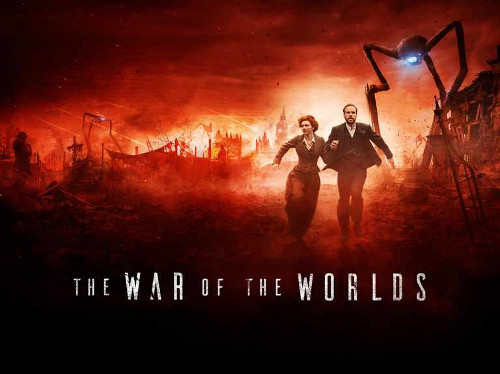
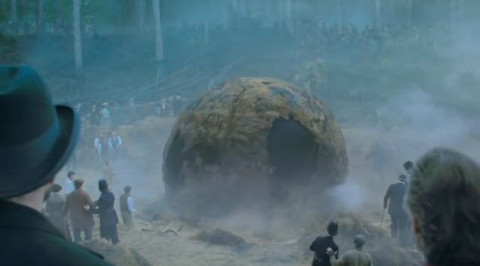
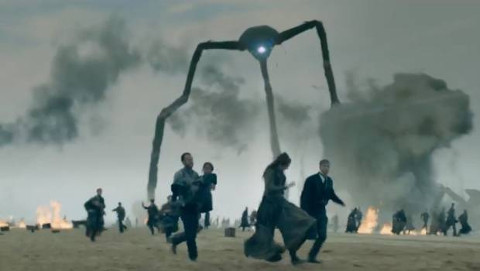

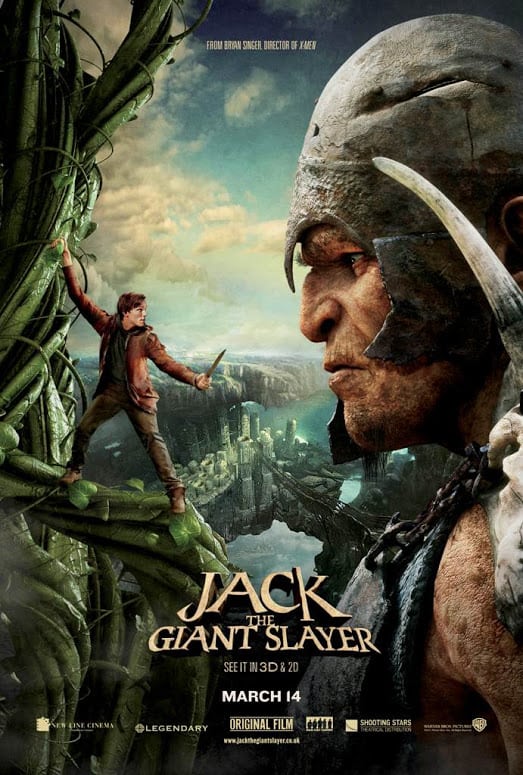
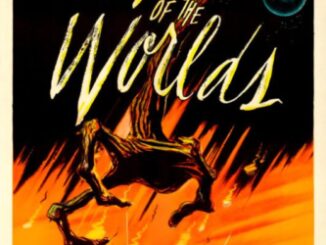
The fact that Ogilvy survives past the first hour is a miracle, given his character is one of the first to die when the Martians arrive (in the book). Add to that his “science to the rescue” germ concoction/weedkiller at the end is ridiculous and unnecessary. The book’s actual conclusion is stronger. I love Robert Carlyle but even he can’t save this one.
A great review, one I can’t really add too, other than state that I had lost all willingness to watch the last episode (i didn’t) due to the fact that it was obvious how it was going to end (world ruined, probable end of mankind, dead aliens etc) The only unknown was were the happy family to be reunited. Frankly i did not care, no emotional involvement. Oh well, may be next time